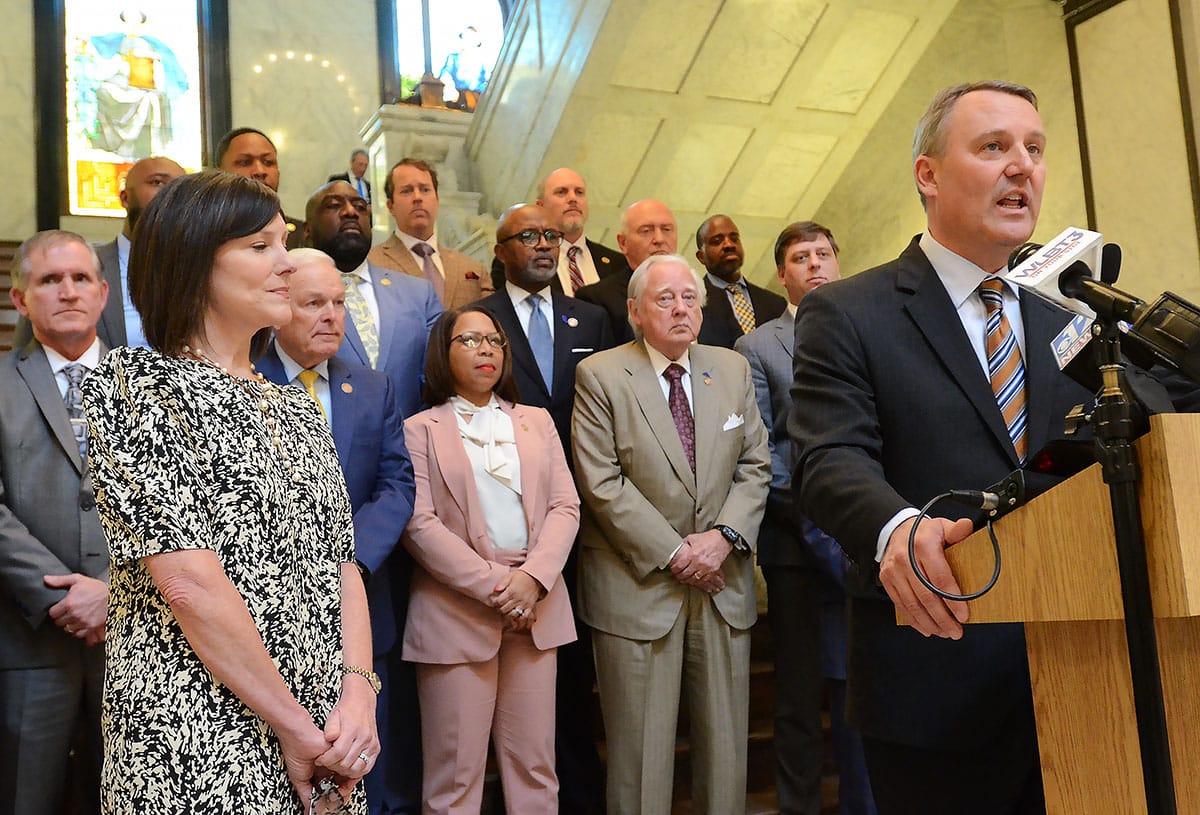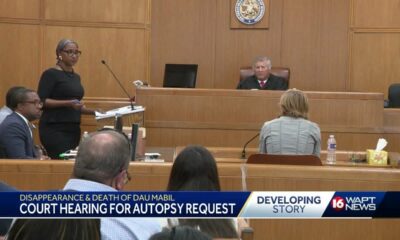Mississippi Today
‘Moral imperative’: House overwhelmingly passes Mississippi Medicaid expansion

Medicaid expansion, which for more than a decade has been blocked by legislative leaders, passed the House Wednesday 98-20 in less than 15 minutes and now advances to the Senate.
House Medicaid Chair Missy McGee, R-Hattiesburg, explained the policy as a “moral imperative” and said it “should transcend politics.” She also said that lawmakers have yet to propose a viable alternative to expansion to deal with Mississippi's lack of health care access and poor health outcomes and that “‘No' is not a policy that has helped.”
No questions followed McGee's explanation of House Bill 1725. The bill passed with more than the two-thirds majority needed to override a potential veto from Republican Gov. Tate Reeves, who for years has opposed Medicaid expansion and reiterated his opposition multiple times during his successful reelection campaign last year.
The measure now heads to the Senate, which is also working on its own version of an expansion bill, as lawmakers consider making Mississippi the 41st state to expand Medicaid.
Authored by new House Speaker Jason White, R-West, and McGee, the bill would expand Medicaid eligibility to 138% of the federal poverty level or about $20,000 annually for an individual. The bill contains a work requirement for recipients of Medicaid expansion, but states that the expansion would go into effect even if the federal government does not approve the work requirement.
“Finding affordable access to health care is not only compassionate, but it is a smart investment in our workforce,” White said in a press conference after the floor vote. “As this bill is transmitted to the Senate for their consideration, I want to acknowledge that they, too, are drafting legislation that will provide health care accessibility options … Today we have sent them a conservative plan that addresses our shared goal to provide health care coverage for hardworking, low-income Mississippians.”
White expressed optimism the governor would sign the bill, saying he believed Reeves recognizes the importance of expanding health care access. Reeves has vehemently opposed Medicaid expansion, calling it “welfare” and “Obamacare.”
“A healthy workforce projects to a healthy economy,” White said. “… I'm not anticipating a veto at this point. I'm anticipating a business-minded, reasonable governor who weighs all options and all things and I think he is just that — in spite of what others may think.”
McGee in the press conference said: “Moving beyond a decade of simply saying ‘no' to finding a workable solution to health access takes effort. But it's a task I believe lawmakers from both parties in both chambers are up for … Most importantly I'm excited about the hundreds of thousands of working Mississippians that now and in the future could have a way toward a better, healthier quality of life.”
The federal government pays 90% of the cost for those covered by Medicaid expansion. Various studies have concluded Medicaid expansion in Mississippi would be a boon for the state economy and provide health care coverage for about 200,000 Mississippians — primarily the working poor. For the first four years, there is projected to be no cost to the state because of $600 million in additional federal funds, offered as an incentive to expand Medicaid.
The bill also has a built-in repealer, meaning the program would automatically end after four years — unless the Legislature chooses to renew it. This likely made it more palatable to Republicans on the fence.
McGee called it a “free pilot program” during a committee meeting and said “if it doesn't work out, if we decide that our health outcomes have not improved, if it costs too much for the state, if for any reason we do not believe that it is doing the things that we want it to do, the program will simply repeal in 2029.”
Unlike the proposal Senate leaders say they are crafting, the House bill would not make expansion contingent on the Biden administration approving the work requirement. That's important, since during the Biden administration CMS has rescinded work requirement waivers previously granted under the Trump administration, and has not approved new ones.
Every lawmaker who voted against the measure was a Republican. Several of those lawmakers refused comment after the vote, including Reps. Greg Haney, R-Gulfport; Stacey Hobgood-Wilkes, R-Picayune and Timmy Ladner, R-Poplarville.
Rep. Bill Kinkade, R-Byhalia, voted against the expansion bill, but said that could change if the measure is improved.
“I'm not convinced that the work component is as solid as they are saying it is,” Kinkade said. “I think this is a step in the right direction, and the conversation is going in the right direction on what we are trying to accomplish, but I was just not ready to vote for this measure right now. The narrative has got to change.”
Rep. Jill Ford, R-Madison, said, “It was an easy No vote for me … I represent one of the most conservative constituencies in the state, and my constituents do not support this. This was not about me. It was about the will of my constituents.”
On the other end of the spectrum, all the Democrats in the House, such as House minority leader Rep. Robert Johnson, D-Natchez, voted for the proposal.
“I kind of felt like it was going to be a great day,” Johnson said. Driving to the Capitol Wednesday morning, he said, he reminisced with former House Democrat leader Bobby Moak about how long they had been working to expand Medicaid.
While Johnson said he wished the bill included components of the House Democrats' plan to provide more private insurance options for people who earn too much to qualify for Medicaid expansion, he said he told his fellow Democrats he would vote for the Republican bill and believed that it would help thousands of Mississippians.
Tamara Grace Butler-Washington, D-Jackson, is a freshman House member who worked years ago for the Mississippi Health Advocacy Program touting the need for Mississippi to expand Medicaid.
“It is a momentous occasion, especially for a freshman legislator to see this, knowing for how long it has been an issue,” she said.
Both Johnson and Butler-Washington praised the leadership of the House for passage of the bill.
Speaker White acknowledged his House colleagues for the overwhelming vote, his Republican colleagues for “strong support on an issue we have neglected for so long,” and the Senate for also drafting expansion legislation.
“In most uncomfortable times is where we make our best marks,” White said at the conclusion of the press conference.
This article first appeared on Mississippi Today and is republished here under a Creative Commons license.
Mississippi Today
The Pulse: Mississippians rally for full Medicaid expansion

Rev. Reginald Buckley joined hundreds of doctors, clergy, and Mississippians from over 35 communities at the Capitol in Jackson for a “Full Expansion Day” rally, urging legislators to expand Medicaid coverage under the federal Affordable Care Act on Tuesday, April 16, 2024.
READ MORE: ‘A matter of life and death': Hundreds rally at Capitol for full Medicaid expansion

Mississippi health news you can't get anywhere else.
This article first appeared on Mississippi Today and is republished here under a Creative Commons license.
Mississippi Today
Senate ushers in new college board appointees with few questions asked about higher education
Hearings for new members of the governing board of Mississippi's public universities last week were in a small, out-of-the-way room on the fourth floor of the Capitol that does not have live-streaming capabilities.
Senate committee meetings are usually broadcast on YouTube, a point of pride for the chamber where lawmakers occasionally mock the Mississippi House for not doing the same.
But the failure to broadcast the hearings for Gov. Tate Reeves' nominees to the Institutions of Higher Learning Board of Trustees means there is no way for students, faculty or staff who could not make it to Jackson to observe the proceedings to know what occurred, even as, according to multiple senators, the meeting was standing-room-only.
This is noteworthy because the IHL Board meetings are pro forma; the 12 trustees almost always vote in lock-step and rarely discuss policy proposals during regular open meetings in Jackson. The Senate has advise-and-consent power on the governor's nominees, so its confirmation hearings are one of the few times trustees, who serve nine-year terms, must take questions from representatives of the public.
Though Reeves' four nominees were asked by Sen. Nicole Boyd, R-Oxford, the chair of the Senate Colleges and Universities Committee, about why they wanted to serve on the IHL board, multiple senators told Mississippi Today they could not recall, or did not ask, the appointees any questions about higher education issues. The nominees were confirmed by the full Senate with no questions on Sunday afternoon.
The committee hearing occurred on April 23 at 1 p.m. in room 407, a small room tucked away in a corner of the fourth floor observation balcony, behind a scanner, a security guard, an assistant's desk and a sign that says “NO ADMITTANCE Senate Staff Only.”

“I really don't think I thought about how it didn't have live-streaming capabilities,” said Boyd, who is also a Senate conferee embroiled in the contentious Medicaid expansion negotiations. “There wasn't anything sinister about it.”
Boyd added that before the committee hearing, she and the chair of the House Colleges and Universities Committee had interviewed the four nominees. She said she was excited about the different experiences the new trustees would bring to the board.
“Our committee really wants to work closely with the college board and the community college board,” Boyd said. “I wish there were cameras in there because it's more of an intimate setting. I would like to have more meetings in there … just because the room is small and you're around the table.”
New IHL board member Jerry Griffith, a retired IRS agent who previously served on the Gaming Commission, said he was even confused if the hearing was public or private when he was contacted by Mississippi Today.
“Please forgive me, I'm not trying to be ugly or anything, but I'm so new to the board,” Griffith said. “I'm not sure if I can share anything.”
Griffith said he would be happy to chat with Mississippi Today after he made some calls, but he did not respond to further inquiries. Charlie Stephenson, the president of the Mississippi State Bulldog Club Board of Directors, and Don Clark, an attorney at Butler Snow, did not respond to Mississippi Today's requests for comment.
The final new board member, Jimmy Heidelberg, an attorney from Pascagoula, said he did not know all the committee members, but that Boyd and several other senators asked him about his education and professional experience.
“She just said we've all got your information and your background, is there anything else you want to add or ask me and I said, ‘well, it was pretty thorough,'” Heidelberg recalled, adding that he told the committee he was also concerned with Mississippi's declining population of college-aged residents.
“I said, ‘we need the best universities that we can have to keep kids home,'” he added.
Heidelberg was not asked about any policies he would support to achieve that goal, and he said he wouldn't speak on that because he is not yet familiar with the board's inner workings.
Mississippi Today asked if he supported the proposal from State Auditor Shad White to defund college degrees that don't contribute to the state's economy.
“I don't know specifically what you're talking about, but I think everybody would share if you go to college and study and achieve a degree, hopefully you will come out to be a contributing citizen with a skill that you can support yourself and your family on,” he said. “That's the point of education.”
This session, a failed effort to rename Mississippi University for Women threw a spotlight on the ailing enrollment of the state's regional colleges. Lawmakers introduced several controversial proposals to reduce the number of public universities in the state, prompting outcry, particularly from supporters of Mississippi's historically Black public universities — Jackson State University, Alcorn State University and Mississippi Valley State University.
Now, just one graduate of those three universities will sit on the IHL board after the Senate confirmed Reeves' nominees. Griffith's background report shows he graduated from Delta State University and had attended Jackson State, Boyd said.
But senators barely, if at all, asked the nominees questions about higher education, multiple sources told Mississippi Today.
“I really didn't have that many questions, and I don't remember that many questions being asked of really any of them,” said Sen. Scott DeLano, R-Biloxi.
That's not the purpose of these hearings, DeLano added. He noted Room 407 was so packed, extra chairs had to be brought in. The presidents of Mississippi State University and Delta State University were in attendance.
“Generally speaking, we don't get into that kind of stuff,” DeLano said. “It's very rare, unless it was a reappointment, but other than that, you don't want to catch somebody off guard or flat-footed on an issue they do not have … background information to understand why we're asking.”
The hearings are more about affirming the nominees' backgrounds, multiple senators said, after an investigation by the legislative watchdog. Boyd asked the nominees why they wanted to be on the IHL board.

“We got a really good sense of who they are and what they're going to bring to the college board, and I'm appreciative of people of that caliber, who could go sit and retire, giving back because the college board takes a ton of time,” Boyd said.
The last time the Senate used its power to reject an IHL appointee was in 1996 when it repeatedly turned down four of Gov. Kirk Fordice's nominees: Hassell Franklin of Houston, Ralph Simmons of Laurel, John McCarty of Jackson and Tom McNeese of Columbia. The four nominees were later confirmed in a special session.
“We want to have some general idea of where someone stands,” DeLano said, “but for the most part those boards are supposed to be independent, and they're supposed to be subject-matter experts.”
Sen. Briggs Hopson, R-Vicksburg, said he couldn't recall much of the meeting because it is the busiest time of year for him. Like other senators who spoke with Mississippi Today, he complimented the accomplishments of two of Reeves' nominees: Clark, the attorney for Butler Snow, and Heidelberg, the Pascagoula attorney, who both graduated from University of Southern Mississippi before attending the University of Mississippi School of Law.
“I don't remember exactly, and I don't know what questions were asked,” Hopson said. “I know I complemented two of the nominees that I've known … My experiences with them have always been positive.”
DeLano said that he had worked with Heidelberg on insurance policies affecting the Mississippi Gulf Coast. Boyd recalled that Clark and Griffith discussed the enrollment cliff that will uniquely affect the regional colleges.
“We've got to make sure that we're progressively and actively managing that and that we're helping our regional universities make sure that they have strong enrollment numbers and growing enrollment numbers,” Boyd said.
Ultimately, the meetings are more about jumpstarting a working relationship than they are fact-finding missions, DeLano said. After the committee wrapped, he said he spoke with Clark about public-private partnerships, because it is relevant to a bill this session that would authorize IHL to enter into a long-term lease agreement on behalf of the University of Mississippi. The bill died in conference yesterday.
“It just gives me a good opportunity to shake hands with whoever those people are and look them in the eye and tell them I look forward to working with them in my role,” DeLano said. “I've seen some committee meetings where they might get partisan on this issue. I don't care about partisanship as much as I care about their willingness to dive deep into the issues and try to understand the totality of the duties that they have.”
Sen. Sollie Norwood, D-Jackson, concurred. He said he did not ask the new trustees any questions but that he hopes to meet with them later this summer to discuss issues pertaining to the HBCUs, mainly the end of the Ayers settlement, which was meant to redress the IHL's historically underfunding of those institutions, and IHL's presidential selection process.
“I want to let them get a chance to get in and get familiar with it and then we can have those conversations,” he said.
Multiple committee members did not return inquiries from Mississippi Today or declined to comment, including: Sen. John Polk, Sen. Daniel Sparks, Sen. Josh Harkins,Sen. Alfred Butler and Sen. Tyler McCaughn.
“I am away from the Capitol and I suggest you call the committee chairwoman Senator Nicole Boyd,” Sen. Walter Michel wrote in a text.
“I wouldn't be the one to talk to,” wrote Sen. Joel Carter, also over text. “I was late due to negotiations on a conference report. I know there weren't very many questions.”
This article first appeared on Mississippi Today and is republished here under a Creative Commons license.
Mississippi Today
On this day in 1945
April 30, 1945

Sister Rosetta Tharpe, known as the “godmother of rock ‘n' roll,” made history by becoming the first gospel artist to rocket up the R&B charts with her gospel hit, “Strange Things Happening Every Day.” In so doing, she paved the way for a strange new sound.
“Rock ‘n' roll was bred between the church and the nightclubs in the soul of a queer Black woman in the 1940s named Sister Rosetta Tharpe,” National Public Radio wrote. “She was there before Elvis, Little Richard and Johnny Cash swiveled their hips and strummed their guitars. It was Tharpe, the godmother of rock ‘n' roll, who turned this burgeoning musical style into an international sensation.”
Born in Arkansas, the musical prodigy grew up in Mississippi in the Church of God in Christ, a Pentecostal denomination that welcomed all-out music and praise. By age 6, she was performing alongside her mandolin-playing mother in a traveling evangelistic troupe. By the mid-1920s, she and her mother had joined the Great Migration to Chicago, where they continued performing.
“As Tharpe grew up, she began fusing Delta blues, New Orleans jazz and gospel music into what would become her signature style,” NPR wrote.
Her hard work paid off when she joined the Cotton Club Revue in New York City. She was only 23. Before the end of 1938, she recorded gospel songs for Decca, including “Rock Me,” which became a huge hit and made her an overnight sensation. Little Richard, Aretha Franklin and Jerry Lee Lewis have all cited her as an influence.
“Sister Rosetta played guitar like the men I was listening to, only smoother, with bigger notes,” said singer-songwriter Janis Ian. “And of course, personally, any female player was a big influence on me, because there were so few.”
After hearing her successors on the radio, Tharpe was quoted as saying, “Oh, these kids and rock and roll — this is just sped up rhythm and blues. I've been doing that forever.”
On the eve of a 1973 recording session, she died of a stroke and was buried in an unmarked grave. In the decades that followed, she finally began to receive the accolades that had eluded her in life.
In 2007, she was inducted into the Blues Hall of Fame, and money was raised for her headstone. Eleven years later, she was inducted into the Rock and Rock Hall of Fame.
“She was, and is,” NPR concluded, “an unmatched artist.”
This article first appeared on Mississippi Today and is republished here under a Creative Commons license.
-
Local News5 days ago
Sister of Mississippi man who died after police pulled him from car rejects lawsuit settlement
-
Mississippi Today5 days ago
At Lake High School in Scott County, the Un-Team will never be forgotten
-
Mississippi Today2 days ago
On this day in 1951
-
Mississippi News3 days ago
One injured in Mississippi officer-involved shooting after chase
-
Mississippi News Video6 days ago
Vehicle struck and killed man lying in the road, Alcorn County sheriff says
-
Mississippi News5 days ago
Ridgeland man sentenced for molesting girl
-
Mississippi News6 days ago
Suspected Dollar General armed robber arrested in Pickens County
-
Mississippi News Video5 days ago
Vehicle fire blocks all lanes of I-55 South in Hinds County





































